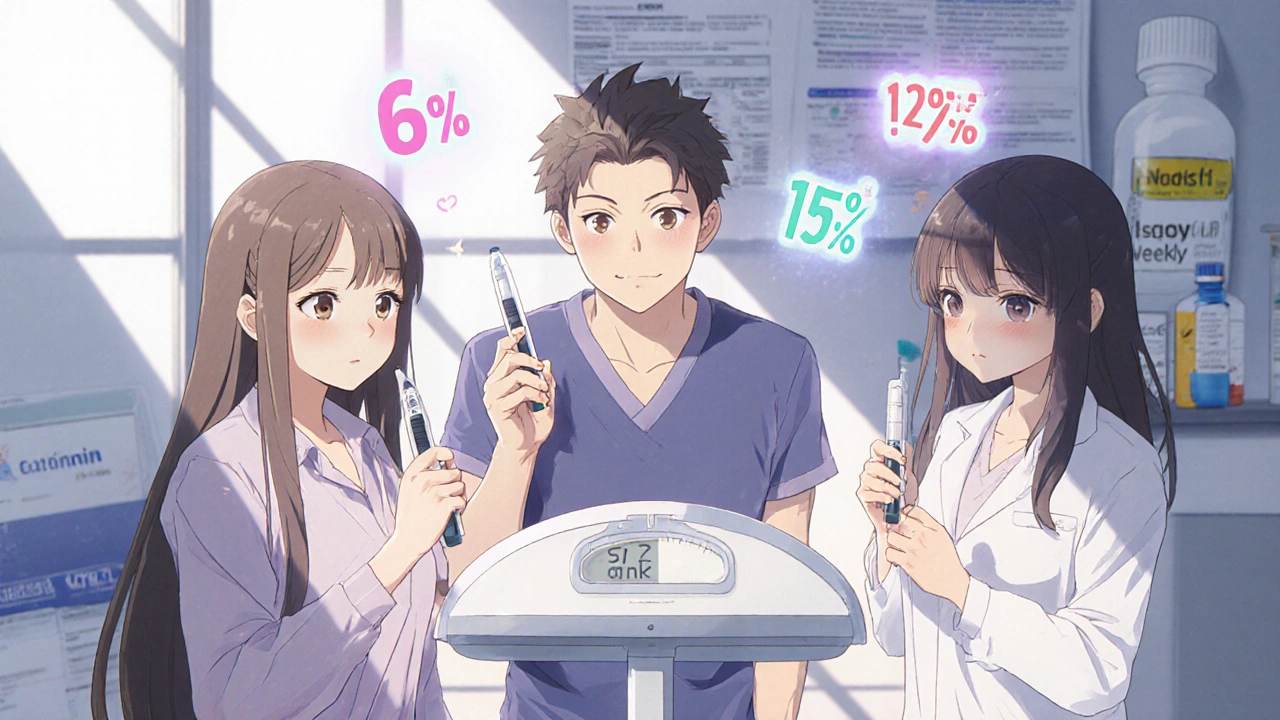If you’re taking Victoza (liraglutide) for type 2 diabetes or weight management, you’ve probably wondered if there’s something better. Maybe your doctor mentioned other options, or you saw ads for Ozempic or Wegovy and got curious. You’re not alone. Thousands of people on Victoza are asking the same thing: Is there a more effective, easier, or cheaper alternative?
What Victoza Actually Does
Victoza contains liraglutide, a drug that mimics a hormone your body naturally makes called GLP-1. This hormone helps your pancreas release insulin when your blood sugar rises - especially after meals. It also slows down digestion so you feel full longer. That’s why it’s used for both type 2 diabetes and, at higher doses, chronic weight management.
Most people take Victoza once a day with a pen injector. The starting dose is 0.6 mg, then it’s increased to 1.2 mg or 1.8 mg over a few weeks. It’s not a quick fix. You need to stick with it for months to see real changes in blood sugar or weight. In clinical trials, people lost about 5-8% of their body weight over a year when using Victoza alongside diet and exercise.
How Ozempic Compares to Victoza
Ozempic (semaglutide) is the most common alternative to Victoza. It’s also a GLP-1 receptor agonist, but it’s a different molecule. Semaglutide lasts longer in your body, so you only need to inject it once a week instead of every day. That’s a big deal for people who forget daily shots or find them inconvenient.
Studies show Ozempic works better than Victoza. In a head-to-head trial, people on Ozempic lost an average of 12% of their body weight over 68 weeks - compared to 6% with Victoza. Blood sugar control also improved more with Ozempic. The starting dose is 0.25 mg weekly, then it increases to 0.5 mg or 1 mg.
But here’s the catch: Ozempic isn’t officially approved for weight loss in New Zealand unless you have type 2 diabetes. If you’re using it just for weight loss, your doctor might prescribe it off-label - which can mean higher out-of-pocket costs.
Wegovy: The Weight-Loss Powerhouse
Wegovy is the same active ingredient as Ozempic - semaglutide - but it’s approved specifically for weight loss. It comes in higher doses: up to 2.4 mg weekly. This is the strongest GLP-1 medication available for obesity.
In clinical trials, people on Wegovy lost an average of 15% of their body weight over 68 weeks. Some lost over 20%. That’s more than most other weight loss drugs on the market. It’s also more effective than Victoza for weight loss - by a wide margin.
But Wegovy is expensive. In New Zealand, it’s not subsidized by PHARMAC for weight loss alone. If you don’t have type 2 diabetes, you’ll pay around $300-$400 per month out of pocket. Many people start on Victoza because it’s cheaper and then switch to Wegovy if they need stronger results.
Other GLP-1 Options: Dulaglutide and Lixisenatide
There are other GLP-1 drugs you might not have heard of, but they’re still used in New Zealand.
- Trulicity (dulaglutide): Injected once a week. Weight loss averages 3-5%, less than Victoza. Often chosen for people who want a weekly shot but don’t need maximum weight loss.
- Adlyxin (lixisenatide): Taken once daily, right before meals. It’s weaker for weight loss and mainly used for blood sugar control. Not commonly prescribed unless other options aren’t suitable.
Neither Trulicity nor Adlyxin are strong contenders if your main goal is weight loss. They’re more about keeping blood sugar stable without the side effects of older drugs like insulin or sulfonylureas.

Non-GLP-1 Alternatives: Metformin, SGLT2 Inhibitors, and More
You don’t have to stick with GLP-1 drugs. Other diabetes medications also help with weight loss - just not as much.
- Metformin: The oldest, cheapest, and safest option. Most people lose 2-5% of their weight on it. It doesn’t cause low blood sugar and is often the first drug prescribed. But it doesn’t match Victoza’s weight loss results.
- SGLT2 inhibitors (like Jardiance, Forxiga): These make your kidneys flush out sugar through urine. People lose 2-4% of their weight. They also reduce heart failure risk, which is a big plus if you have heart disease.
- Insulin: Actually causes weight gain. If you’re on insulin and struggling to lose weight, switching to a GLP-1 drug might help.
Some doctors combine drugs - like metformin with Victoza - to get better results. That’s common practice. But combining two GLP-1 drugs (like Victoza and Ozempic) isn’t safe and isn’t done.
Side Effects: What You Might Experience
All GLP-1 drugs share similar side effects because they work the same way. The most common are nausea, vomiting, diarrhea, and constipation. These usually fade after a few weeks as your body adjusts.
More serious risks include pancreatitis, gallbladder disease, and a possible link to thyroid tumors in rats (though not proven in humans). If you have a personal or family history of medullary thyroid cancer or multiple endocrine neoplasia, you shouldn’t take any of these drugs.
Wegovy and Ozempic tend to cause more nausea than Victoza because of the higher doses. But many people tolerate them fine once they’re on the full dose. If nausea is a problem, your doctor can slow down the dose increase.
Cost and Access in New Zealand
Cost is often the deciding factor.
- Victoza: Subsidized by PHARMAC for type 2 diabetes. Costs about $15-$25 per prescription if you have a community services card. Not subsidized for weight loss alone.
- Ozempic: Subsidized only if you have type 2 diabetes and meet specific criteria (like HbA1c over 7.5% despite other meds). Without subsidy, it’s $250-$350 per month.
- Wegovy: Not subsidized at all for weight loss. Around $300-$400 per month.
- Metformin: $5-$10 per month, fully subsidized.
If you’re paying out of pocket, Victoza is the cheapest GLP-1 option. But if you can afford it and want better results, Ozempic or Wegovy might be worth the cost.

Which One Should You Choose?
There’s no single best drug. It depends on your goals, budget, and health history.
- Best for weight loss: Wegovy (2.4 mg weekly)
- Best balance of effectiveness and cost: Victoza (if subsidized) or Ozempic (if you have diabetes)
- Best for simplicity: Ozempic or Trulicity (weekly shots)
- Best for budget: Metformin
- Best for heart protection: SGLT2 inhibitors like Forxiga
If you’re not losing enough weight on Victoza, switching to Ozempic or Wegovy is the next logical step. If cost is a barrier, talk to your doctor about starting with metformin and adding a GLP-1 later.
What Happens If You Stop?
These drugs don’t cure diabetes or obesity. They manage it. If you stop taking them, you’ll likely regain the weight you lost - often within 6 to 12 months. That’s true for Victoza, Ozempic, and Wegovy alike.
That’s why lifestyle changes matter. Even if you’re on medication, eating more protein, moving more, and getting enough sleep will help you keep the weight off. Medication makes it easier. It doesn’t replace healthy habits.
Final Thoughts
Victoza is a solid option, especially if you’re covered by PHARMAC. But if you’re not seeing the results you want - or you’re tired of daily injections - there are better choices. Ozempic and Wegovy offer stronger weight loss and fewer injections. Metformin is still the foundation for many people. And SGLT2 inhibitors bring extra heart benefits.
The key is to talk to your doctor about your goals. Are you trying to lower your HbA1c? Lose 10 kg? Reduce your risk of heart disease? Your answer will guide the choice. Don’t assume the first drug you were given is the best one for you now.
Is Victoza the same as Ozempic?
No. Victoza contains liraglutide and is taken daily. Ozempic contains semaglutide and is taken once a week. They’re both GLP-1 drugs, but semaglutide is more potent and lasts longer in the body. Ozempic generally leads to greater weight loss and better blood sugar control.
Can I switch from Victoza to Ozempic?
Yes, many people do. Your doctor will stop Victoza and start you on Ozempic at the lowest dose (0.25 mg weekly). You won’t need to overlap the two. The switch is safe and common, especially if you want better results or fewer injections.
Is Wegovy better than Victoza for weight loss?
Yes. In clinical trials, Wegovy led to 15% average weight loss over a year, compared to 6% with Victoza. Wegovy uses a higher dose of the same active ingredient as Ozempic and is specifically approved for weight loss. If your goal is maximum weight loss, Wegovy is the strongest option available.
Why is Victoza cheaper than Ozempic in New Zealand?
Victoza is subsidized by PHARMAC for type 2 diabetes, meaning the government covers most of the cost. Ozempic is only subsidized under strict conditions - usually if you’ve already tried other medications and still have high blood sugar. Without subsidy, Ozempic costs over $250 per month, while Victoza can be under $25 with a community services card.
Do GLP-1 drugs cause muscle loss?
Some weight loss from GLP-1 drugs comes from muscle, not just fat - especially if you’re not exercising or eating enough protein. To preserve muscle, aim for 1.6-2.2 grams of protein per kilogram of body weight daily and include strength training 2-3 times a week. This helps ensure most of the weight lost is fat.
Next Steps
If you’re on Victoza and not happy with your results, don’t just keep going. Schedule a chat with your doctor. Bring a list of your goals: How much weight do you want to lose? What side effects are bothering you? What are you willing to pay?
If cost is a barrier, ask about metformin or SGLT2 inhibitors first. They’re cheaper and still effective. If you’re ready to upgrade, ask about Ozempic or Wegovy. Many people find the weekly injection easier than daily ones - and the results are worth it.
Medication is a tool. It doesn’t replace diet, movement, or sleep - but it can make those things work better. The right drug for you is the one that fits your life, your budget, and your goals.

